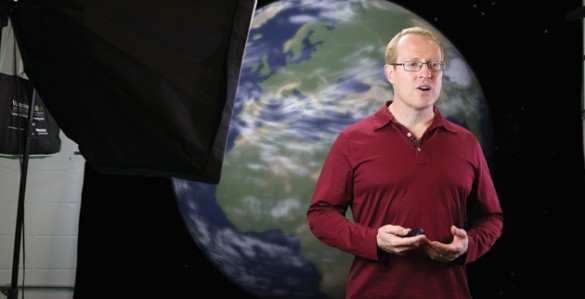
Vanderbilt University and the University of Maryland have teamed up to introduce a new approach to massive open online courses, or MOOCs – a two-part, sequenced course offered through the digital learning platform Coursera.
The joint MOOC will begin Jan. 6, 2014, with the Maryland course, “Programming Handheld Systems with Android.” It will continue March 10 with the Vanderbilt course, “Pattern-Oriented Software Architecture.” Students will learn how to develop a mobile app and how to connect it to a computing cloud. Each segment of the course will be 8 to 10 weeks long. Like all Coursera classes, the sequenced courses are free and open to all.
The project, which is the first multi-institutional, two-part MOOC, demonstrates a collaboration that would have been unmanageable in the past, the organizers say.
“Creating such an opportunity for Vanderbilt and University of Maryland students alone would be incredibly complex in a traditional environment. With the MOOC platform, not only is it possible, it will now be available to learners globally,” Douglas Schmidt, professor of computer science and of computer engineering at Vanderbilt said. Schmidt and Jules White, assistant professor of electrical engineering and computer science, will teach the Vanderbilt course. The Maryland portion of the course will be taught by Professor of Computer Science Adam Porter.
“This trans-institutional and interdisciplinary MOOC sequence will provide an exemplar of how intentionally coordinated MOOCs can create learning communities that cut across traditional institutional and disciplinary boundaries,” Schmidt continued.
“We’re offering students a one-two punch by pairing these courses,” Maryland computer scientist Ben Bederson, who serves as special adviser on technology and educational transformation, said. “Students will learn the concepts, principles and skills needed to create and examine, from end-to-end, an app that integrates mobile devices with cloud computing platforms.”
“The energy that the faculty members of both campuses have brought to this project is telling. The enthusiastic – almost boisterous – conversations about what is possible with this collaboration have not only been intellectually stimulating, but also just plain fun,” Cynthia Cyrus, associate provost of undergraduate education, said. Cyrus has led the university’s partnership with Coursera and its exploration of other digital platforms. “The experience for the students who choose to take both courses should be more than just a two-course experience; they are going to gain a deep understanding of the mobile device and cloud programming domain.”
A set of programming assignments will help integrate the material covered in both courses in the sequenced MOOCs. Students taking Porter’s course will build the user-facing portions of a mobile app using server modules provided by Schmidt and White. Students in Schmidt and White’s course will build the server portions of the app using client modules that will be provided by Porter. The end result will be a complete app that demonstrates the pattern-oriented integration of mobile devices with cloud computing platforms.
The app the students develop will support global collection and analysis of data in a range of domains, which other MOOC instructors could use as part of their future offerings.
“Faculty-driven collaborations have historically been common in the research sphere, but the MOOC environment now allows that visceral excitement that comes from the sharing of different perspectives to be applied to the teaching domain as well,” Cyrus said.
Vanderbilt and Maryland each joined Coursera last September. Schmidt’s course was among Vanderbilt’s initial offerings and had more than 30,000 registered students.
In May 2013, Vanderbilt Chancellor Nicholas S. Zeppos announced the launch of the Vanderbilt Institute for Digital Learning to manage, explore and study the university’s development and implementation of MOOCs and other digital learning platforms. VIDL is led by Douglas Fisher, associate professor of computer science and of computer engineering.
Visit the Vanderbilt Digital Learning website to learn more about the university’s digital learning initiatives. Visit the Coursera website to learn more about Coursera and to register for classes.